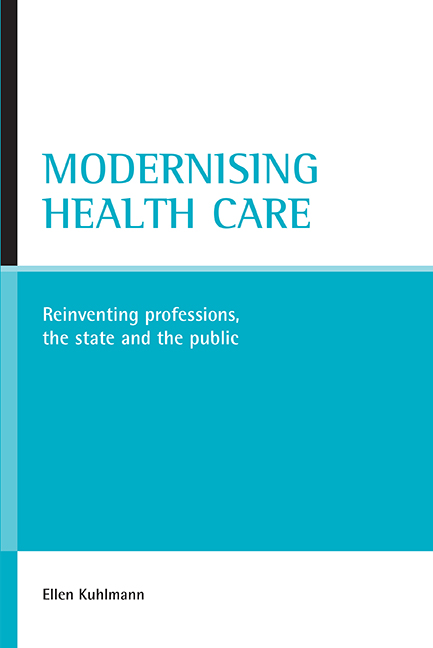Book contents
- Frontmatter
- Contents
- List of tables and figures
- Acknowledgements
- Abbreviations
- Glossary
- Introduction
- one Towards ‘citizen professionals’: contextualising professions and the state
- Part I Mapping change in comparative perspective
- Part II Dynamics of new governance in the German health system
- Part III The rise of a new professionalism in late modernity
- References
- Appendix: Research design of the empirical in-depth study
- Index
- Also available from The Policy Press
eight - Professions and trust: new technologies of building trust in medical services
Published online by Cambridge University Press: 15 January 2022
- Frontmatter
- Contents
- List of tables and figures
- Acknowledgements
- Abbreviations
- Glossary
- Introduction
- one Towards ‘citizen professionals’: contextualising professions and the state
- Part I Mapping change in comparative perspective
- Part II Dynamics of new governance in the German health system
- Part III The rise of a new professionalism in late modernity
- References
- Appendix: Research design of the empirical in-depth study
- Index
- Also available from The Policy Press
Summary
Professions play a key role in building trust in the provision of health care. At the same time, the capacity of professional self-regulation to serve the interests of the public and to ensure the quality and safety of health care has come under scrutiny. This chapter highlights new perspectives in the debate on trust in health care. Instead of simply echoing the ideological complaints of the medical profession on the potentially adverse effects of the tighter control of providers, it brings into view new ‘technologies’ of building trust. This approach directs attention towards the intersections and tensions between changing patterns of governing the health professions and the new ‘signifiers’ of trustworthiness, which are based on tools from NPM. Both physicians and service users are increasingly demanding transparency and ‘rational’ criteria to prove the trustworthiness of providers. I argue that the information metaphor serves to amalgamate the call for the control of providers and the desire to seek trust in medical services. It is a key component in new technologies of trust building and the ‘bridge’ between the various actors and diverse interests in health care. The crucial point is that this bridge is constructed following the blueprint of the biomedical knowledge system. At the same time, it opens up pathways for changes in professionalism and, in turn, new forms of trust building that may further participation of service users.
Demanding control and seeking trust: a parallel march
Provision of health care is a societal field in which trust plays a key part at a number of levels. In this context, the significance of trust as a regulatory mechanism between macro and micro-level regulation, and between individuals, organisations and state institutions, comes to the fore. Even if information on health care has improved, the power and knowledge gap between health professionals and service users remains striking (Gilson, 2003), and trust may serve to bridge this gap. However, the trust of citizens and patients in the provision of health care is increasingly challenged. Medical scandals, deficits in the organisation of providers and the quality and efficiency of care on the one hand, and scarcity of resources and the various forms of rationing of health care on the other, are some of the reasons for the eventual erosion of trust in the health care system.
- Type
- Chapter
- Information
- Modernising Health CareReinventing Professions, the State and the Public, pp. 181 - 198Publisher: Bristol University PressPrint publication year: 2006



